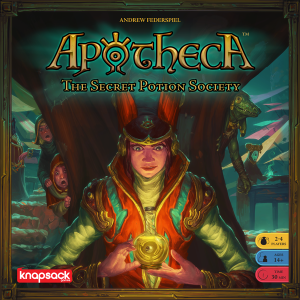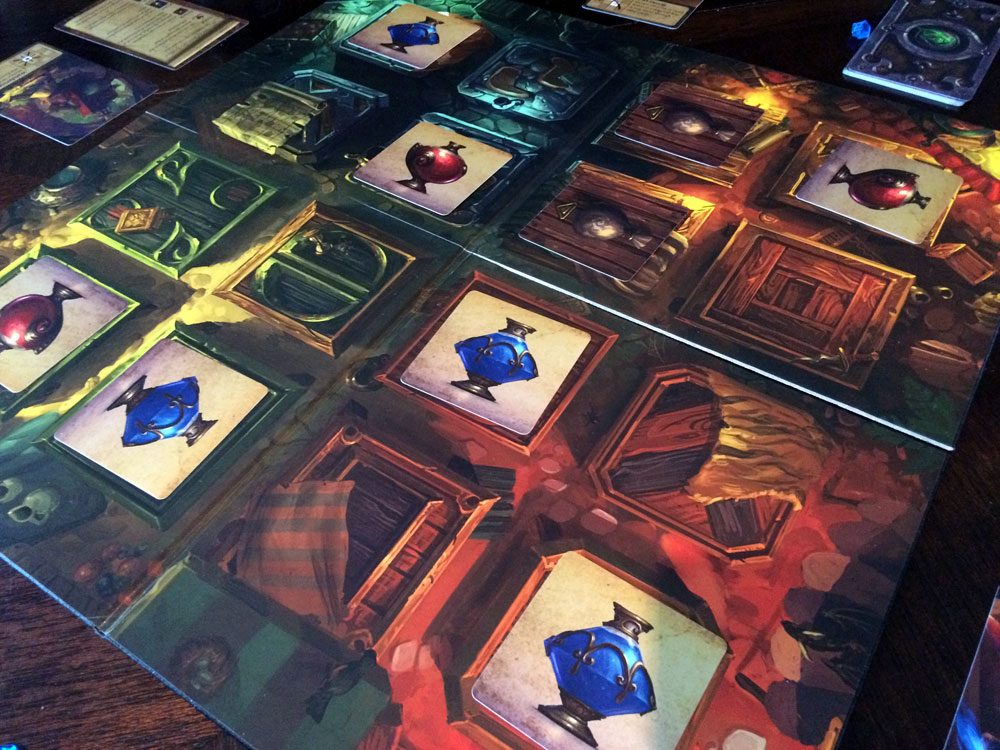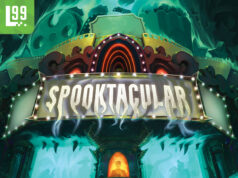Note: This preview uses pre-release components and rules. What you see here may be different from the final, published game.
 As a college chemistry major, it should be no surprise that I find my gaming predilections lean towards any theme having to do with alchemy and potions. Aside from board games, this leaks over into other gaming such as tabletop RPGs (I am playing my 2nd alchemist in as many campaigns), video games (Lil’ Alchemist has become my new obsession) and books (where I’d be Professor Snape’s star pupil).
As a college chemistry major, it should be no surprise that I find my gaming predilections lean towards any theme having to do with alchemy and potions. Aside from board games, this leaks over into other gaming such as tabletop RPGs (I am playing my 2nd alchemist in as many campaigns), video games (Lil’ Alchemist has become my new obsession) and books (where I’d be Professor Snape’s star pupil).
Apotheca, an upcoming release by Knapsack Games, puts players in the role of alchemists trying to gather ingredients for potions, while using bluffing and strategy to prevent their competitors from brewing first. Does Apotheca emerge from the cauldron as a successful creation, or does it end up a congealed and smelly mess? Keep reading to find out.
Apotheca is a strategy and deduction game for 2-4 players that takes between 15-30 minutes to play. Apotheca plays well with any number of players.
Game Overview
In Apotheca, potions are placed and moved around the marketplace board in order to line like potions in rows and columns, which can then be scored. Potion cards are placed face-down by players, giving them sole knowledge of which potion is which in the marketplace. Players can reveal potion cards to earn gems, which are used to purchase apothecaries.
Apothecaries provide special powers that allow players to move potions around in different patterns, and are needed in order to score a set of potions. The first player that scores three potions is declared the winner!
How to Play

The marketplace board consists of a 4×4 grid where potions are placed and moved around during the game. To begin the game, 6 potions are set up in a starting layout, three face-up and three face-down, giving the players some initial information as to the board state. Each player is also dealt an apothecary card, which will be described below.
On their turn, players take two of the following actions: revealing a potion, restocking potions, using an apothecary power or purchasing an apothecary.
Revealing a potion allows a player to turn a face-down potion face-up (without peeking first at the card), earning them a gem matching the color of the potion. This means that sometimes a player may not know the type of potion they are flipping.
Restocking allows players to draw a new potion, look at it, then place it face-down anywhere on the marketplace, giving them hidden knowledge of that card.
Apothecary powers can be used to move cards around in various ways, such as chess-like moves of rooks, pawns and knights, or through swapping or shifting of whole rows.
New apothecaries can be purchased by spending gems earned through revealing potions.
The goal of the game is to line up three face-up potions of the same color either horizontally or vertically. When these potions come into alignment, they are removed from the board, and placed on an open apothecary card, preventing you from using their power for the rest of the game. If more advanced patterns can be made (a row of 4, an L-shape or t-shape) then a gem is earned when that potion is scored. If a free apothecary is not available when the potions are lined up, a gem is earned by the player but the potion does not count as scored, forcing players to continue to purchase apothecary cards. The game ends when one player scores three potions.

Game Experience
Apotheca is a game that has minimal setup time and a rule set that is very easy to explain and understand. From opening the box to play may have only taken 5 minutes, which is a testament to how this game hits the table running. Made easier is an “intro” setup instruction where the apothecary deck is stacked with some of the more basic cards on top, making the first play even smoother by avoiding any powers that could be too complex.

For a game with such simple rules, Apotheca provides a good amount of strategy in a small package. Since you do not have perfect knowledge of all the face-down potions, there is quite a bit of supposition and deduction that needs to occur when deciding which actions you are going to take. In addition, having some hidden knowledge of your own allows you to bluff your opponents into thinking a face-down potion may be of a particular type, enticing them to make a move that will not help them while at the same time move you towards a scoring line.
The apothecary cards provide both a means of creating small variability in play and a way of driving the game action forward. Since only a limited number of apothecary cards are revealed each play, they vary from game to game, different power interactions and overlaps can be explored each game. They drive the action forward by forcing players to keep purchasing the apothecary cards in order to score potions. An additional twist in gameplay is thrown in by causing an apothecary’s powers to be unusable once they have been used to score a potion, which adds a little more strategy to the game. While the powers themselves are interesting, we did find some of the powers to be a bit more unbalanced than others, which should be addressed before the final release of Apotheca.
Variability seems to be an issue with Apotheca, with the game becoming somewhat repetitive after a number of plays. We found that the best way to change up the game was to alter the number of players, with two, three and four-player games each having their own distinct flow and feel. With two players, we were able to develop some strategy and planning, while three player games devolved rapidly into chaos. We also enjoyed the four-player “2×2” team game, where two pairs battled it out. We did also find that the “opening lines” of the game tended to be similar for the first few turns, but that may just be the strategy in which we approached the game.

A question we continually ask as we play through new and upcoming games is “Who is this game meant for?” a question that helped us form our positive opinion of Apotheca. While not the deepest of games, we felt that the game would be enjoyable as a warm-up for a meatier game. We also feel that this game is perfect for younger gamers, as it provides a game that has elements of strategy (pattern matching) with some newer mechanics they may not have been exposed to (such as hidden information and action selection). When played as a 4-player game, this becomes even better, with a younger gamer paired up with a parent on a team.
While we were excited about the alchemy theme, it did not shine through in the gameplay as much as we had hoped. As gamers who love creating narratives in our board game plays, we found that the mechanics did not really support the theme. However, the artwork is beautiful and in line thematically, with fantasy tropes and potion marketplaces all being represented in an interesting and appealing manner. It should be noted that the artwork is also not what we would consider “juvenile,” another reason why this game can work well with younger gamers.
Final Thoughts
Apotheca provides a good game in a small package. A surprising amount of strategy combined with a quick playtime and easy rules adds up to a game that should be on your radar. Elements of deduction and pattern matching, bluffing and action selection come together in a solid way, with the artwork making this game visually appealing. Apotheca is recommended for gamers looking for something quick and light, and highly recommended for any gamer parents who are looking for a game to introduce some different mechanics to their gamer offspring.
If you’d like to become a backer, pledges start at $35 the full game and stretch goals. Apotheca is scheduled to be in backers hands in June of 2016 and you have until Thursday, July 9th to become a backer. Head over today and check it out.
As always, we don’t post ratings for preview copies as the components and rules may change from the final game. Check back with us after the game is produced for a full review.





















